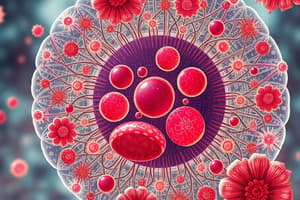Podcast
Questions and Answers
What is the primary function of a mitochondrion in a cell?
What is the primary function of a mitochondrion in a cell?
- To produce energy (correct)
- To synthesize proteins
- To regulate the cell cycle
- To store genetic information
Which of the following statements accurately describes ribosomes?
Which of the following statements accurately describes ribosomes?
- They govern cell division.
- They are responsible for lipid metabolism.
- They only exist within the nucleus.
- They are involved in protein synthesis. (correct)
What role does the cell membrane play in a cell?
What role does the cell membrane play in a cell?
- It generates energy through cellular respiration.
- It controls the genetic information.
- It provides structural support for the nucleus.
- It acts as a barrier and regulates transport. (correct)
Which component is primarily responsible for the synthesis of ATP?
Which component is primarily responsible for the synthesis of ATP?
Which organelle is involved in the post-translational modification of proteins?
Which organelle is involved in the post-translational modification of proteins?
Flashcards are hidden until you start studying
Study Notes
Mitochondria
- Responsible for cellular respiration, generating ATP (adenosine triphosphate) through the breakdown of glucose.
- The primary source of energy for the cell.
Ribosomes
- Responsible for protein synthesis.
- Composed of ribosomal RNA (rRNA) and proteins.
- Found in the cytoplasm and attached to the endoplasmic reticulum.
Cell Membrane
- Acts as a selectively permeable barrier between the cell's interior and the external environment.
- Regulates the passage of molecules into and out of the cell.
- Plays a role in cell signaling and communication.
ATP Synthesis
- The mitochondria is primarily responsible for ATP synthesis.
- ATP is the primary energy currency for most cellular processes.
Protein Modification
- The Golgi apparatus is involved in the post-translational modification of proteins.
- Modifies, sorts, and packages proteins before they are transported to their final destination.
Studying That Suits You
Use AI to generate personalized quizzes and flashcards to suit your learning preferences.




